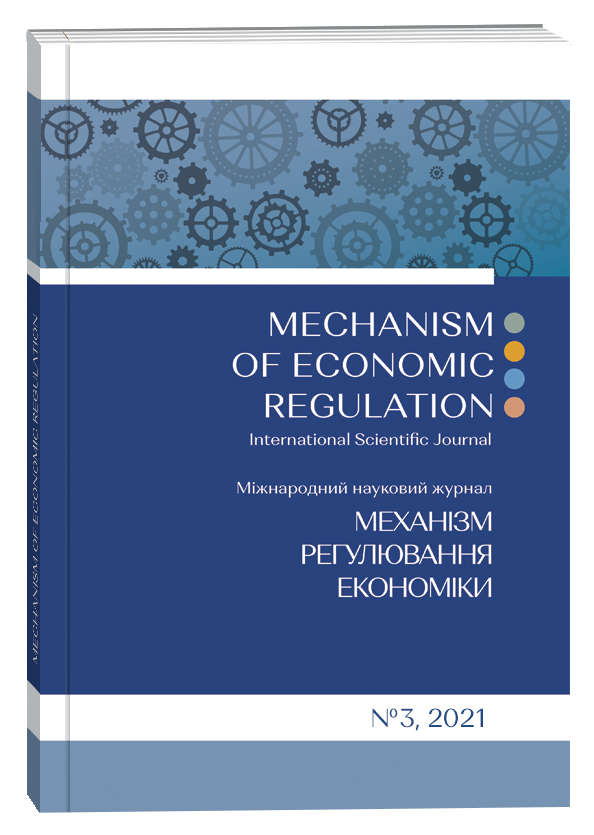ECONOMICS OF ENTERPRISES, TERRITORIES AND MACROECONOMIC SYSTEMS IN THE CONDITIONS OF DIGITAL TRANSFORMATIONS: FROM STABILITY AND LINEAR THINKING TO ANTIFRAGILITY AND NONLINEAR, INNOVATIVE THINKING
Abstract
The article investigates the concept of fragility. The authors analyze this phenomenon in the transition of economic systems to the digital economy. Based on the analysis of scientific publications, especially N. Taleb, the definition of "fragility" is formulated as a property of the system to become more stable and perfect under the influence of adverse factors. The key components based on which the phenomenon of anti-fragility is realized analyzed: changes, errors and moderate stresses. The main sources of non-deterministic (indeterminate, random) changes are formulated, as a result of which conditions may arise those force systems to use anti-fragility agents. Three bases of a phase of origin and realization of economic systems actions for the formation of their properties of fragility are formulated: decrease in efficiency, the emergence of virtual states, selection of options for implementation. The principles of ensuring anti-fragility of economic systems are developed: application of innovations, tolerance to changes, elimination of fragile components, self-management of the team, minimization of excessive risk, formation of resource reserve, focus on strategic goals, activation of nonlinear thinking. Key recommendations on the fragile management of economic systems are added. The principle applies to linear logic: under different conditions – a different strategy. It is concluded that anti-fragility is a universal tool suitable for different organizations, regardless of their parameters. Due to this phenomenon, the leaders of economic systems can influence the state of their organizations under the influence of external factors, which they are unable to control. Such factors may include a change in demand for certain products, fluctuations in economic conditions, the transformation of consumer behaviour, changes in the circumstances of competition, economic conditions, social and political events, etc.
References
Taleb N. N. Antifragile: Things that gain from disorder. New York : Random House, 2012. 544 p.
Талеб Н. Н. Антикрихкість: про (не)вразливе у реальному житті. Київ : Наш Формат, 2021. 400 с.
10 Principles to live an antifragile life. Philosophy. URL: https://fs.blog/an-antifragile-way-of-life (дата звернення: 03.06.2021).
Богомолова Е. Из чего складывается антихрупкость бизнеса. Проект коронаФОМ. URL: https://covid19.fom.ru/post/iz-chego-skladyvaetsya-antihrupkost-biznesa (дата звернення 03.06.2021).
Мельник В. Л. Формування сучасних маркетингових стратегій в умовах пандемії коронавірусу. Сучасні промислові революції та удосконалення механізмів сестейнового соціально-економічного розвитку : монографія / за ред. Л.Г. Мельника, О.М. Маценка. Суми : Університетська книга, 2021. С. 325−334.
Донець Л. І., Шепеленко О. В., Баранцева С. М., Сергєєва О. В., Веремейчик О. Ф. Обґрунтування господарських рішень та оцінювання ризиків : навч. посіб. / за заг. ред. Л. І. Донець. К. : Центр учбової літератури, 2012. 472 с.
Пригожин И. От существующего к возникающему. Время и сложность в физических науках. Москва : Наука, 1985. 328 с.
Анчаров М. Л. Самшитовый лес. Приглашение на праздник: романы и повести. Москва : Художественная литература, 1986. С. 10–298.
McMahon M. Why is uncertainty so damaging for the economy? Recession & recovery. URL: https://www.economicsobservatory.com/why-uncertainty-so-damaging-economy (дата звернення: 29.05.2021).
Gieseck A., Rujin S. The impact of the recent spike in uncertainty on economic activity in the euro area. ECB Economic Bulletin, Issue 6/2020. URL: https://www.ecb.europa.eu/pub/economicbulletin/focus/2020/html/ecb.ebbox202006_04~e36366efeb.en.html (дата звернення: 20.05.2021).
Balbo, N. Fertility Theory. International Encyclopedia of the Social & Behavioral Sciences: Second Edition. 2015. P. 19–27. https://doi.org/10.1016/B978-0-08-097086-8.34045-4
Taleb N. N. Antifragile: the black swan: The impact of the highly improbable. New York: Random House Publishing, 2010. 444 p.
Гараедаги Д. Системное мышление: как управлять хаосом и сложными системами: Платформа для моделирования архитектуры бизнеса. Минск : Гревцов Букс, 2010. 480 с.
Майнцер К. Сложносистемное мышление: материя, разум, человечество. Новый синтез. Москва : Книжный дом «Либроком», 2009. 464 с.
Taleb, N. N. (2012). Antifragile: Things that gain from disorder. Random House.
Taleb, N. N. (2021) Antykrykhkist: pro (ne)vrazlyve u realnomu zhytti [Antiаragility. About (Not) Vulnerable in Real Life]. Nash Format. [in Ukrainian].
10 Principles to live an antifragile life. (2021). Philosophy. Retrieved from https://fs.blog/anantifragile-way-of-life
Bogomolova, E. Iz chego skladyivaetsya antihrupkost biznesa. [What constitutes the antifragility of a business.] Project KoronaFOM. Retrieved from https://covid19.fom.ru/post/iz-chego-skladyvaetsyaantihrupkost-biznesa [in Russian].
Melnyk, V. L. (2021). Formuvannia suchasnykh marketynhovykh stratehii v umovakh pandemii koronavirusu [Formation of current marketing strategies in the context of the coronavirus pandemic]. In L. Melnyk & O. Matsenko (Eds.), Suchasni promyslovi revoliutsii ta udoskonalennia mekhanizmiv sesteinovoho sotsialno-ekonomichnoho rozvytku – Modern industrial revolutions and improvement of mechanisms for sustainable socio-economic development (The EU experience and practice of the Ukraine) (pp. 325-334). University book. [in Ukrainian].
Donets, L., Shepelenko, O., Barantseva, S., Serhieieva, O. & Veremeichyk, O. (2012). Obgruntuvannia hospodarskykh rishen ta otsiniuvannia ryzykiv [Justification of business decisions and risk assessment] (L. Donets, Ed.). CUL. [in Ukrainian].
Prigozhin, I. (1985). Ot suschestvuyuschego k voznikayuschemu. Vremya i slozhnost v fizicheskih naukah [From existing to emerging. Time and complexity in the physical sciences]. Nauka [in Russian].
Ancharov, M. (1986). Samshitovyiy les [Boxwood forest]. Priglashenie na prazdnik: romanyi i povesti – Party Invitation: Novels and Novels (pp. 10-298). Khudozhestvennaya Literatura. [in Russian].
McMahon M. Why is uncertainty so damaging for the economy? Recession & recovery. Retrieved from https://www.economicsobservatory.com/why-uncertainty-so-damaging-economy
Gieseck, A. & Rujin, S. (2020). The impact of the recent spike in uncertainty on economic activity in the euro area. Economic Bulletin, Issue 6/2020. (pp. 61-64). European Central Bank.
Balbo, N. (2015). Fertility Theory. International Encyclopedia of the Social & Behavioral Sciences, 2nd edition, Volume 9, 19–27. Elsevier Ltd. https://doi.org/10.1016/B978-0-08-097086-8.34045-4
Taleb, N. N. (2010). Antifragile: the black swan: The impact of the highly improbable. New York: Random House Publishing.
Garaedagi, D. (2010). Sistemnoe myishlenie: kak upravlyat haosom i slozhnyimi sistemami: Platforma dlya modelirovaniya arhitekturyi biznesa [Systems Thinking: How to Manage Chaos and Complex Systems: Platform for Business Architecture Modeling]. Grevtsov Books. [in Russian].
Mayntser, K. (2009). Slozhnosistemnoe myishlenie: materiya, razum, chelovechestvo. Novyiy sintez [Complex system thinking: matter, mind, humanity. New synthesis]. Book house “Librokom”. [in Russian].


